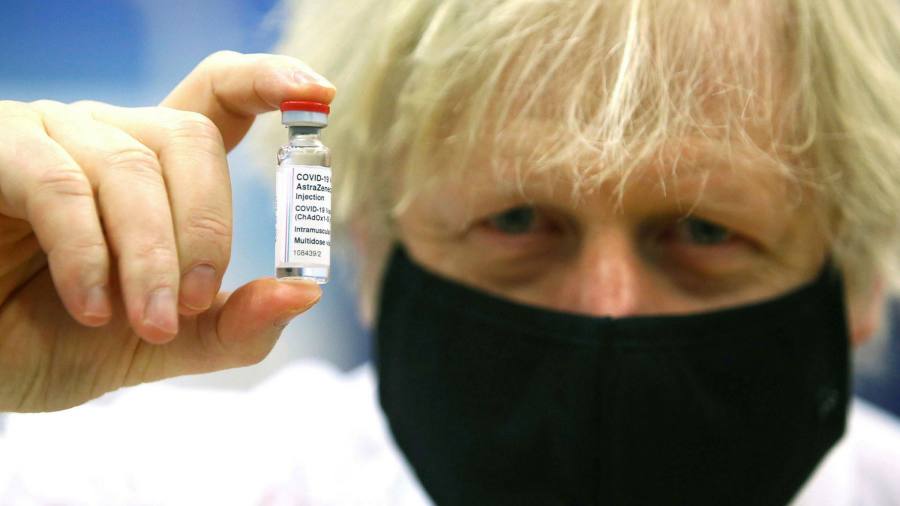[ad_1]
Brussels on Wednesday hit back in a row with Boris Johnson over coronavirus vaccine exports, with European officials highlighting how Britain has received more doses than any other country monitored under new EU controls.
The UK prime minister denied claims by Charles Michel, European Council president, that Britain had introduced an “outright ban†on vaccine exports.
The European Commission acknowledged no such ban was in place, but EU officials noted that Michel had been drawing attention to the fact that no vaccines have so far been sent from the UK to the bloc.
The row with the UK — which led to an EU official being summoned to the Foreign Office in London to explain Michel’s comments — sparked acute frustration in Brussels given the bloc’s status as a major Covid-19 vaccine exporter.
“We in the EU are a very, very active exporter of vaccines — and this is not necessarily the case for all our partners,†said a spokesperson for the commission.
While bemoaning the “sloppy†drafting of a blog post by Michel, in which he accused the UK of imposing a ban on vaccine exports and their components, one EU diplomat said Britain’s contractual relationships with pharmaceutical companies had the effect of restricting shipments of any doses outside Britain.
“They are creating another row [with the EU] for domestic political purposes,†added the diplomat. “No one at this moment thinks the UK is honestly looking for a successful, fruitful relationship.â€Â
The UK is currently the biggest recipient of reported EU vaccine exports, securing 9.1m doses under the bloc’s authorisation scheme that came into force on January 30, said European officials. The EU controls were put in place after the bloc struggled to secure adequate volumes of vaccines for member states.
The 9.1m doses for the UK form part of total EU exports of 34.1m doses to 31 countries covered by the bloc’s data.
The next largest recipient has been Canada, with 3.9m doses, followed by Mexico at 3.1m, said the European officials, citing figures to Tuesday of this week. The data do not include exports prior to January 30 or to the scores of countries, mainly poorer nations, that are exempt from the EU controls.
A big part of the EU’s export activity is simply a function of where manufacturing sites for leading vaccines are located. Both BioNTech/Pfizer and Moderna supply the world — excluding the US — through European manufacturing.Â
It is unclear how many doses — if any — the UK has exported of the vaccine developed by Oxford university and AstraZeneca. Pascal Soriot, AstraZeneca’s chief executive, said last year the company would “prioritise the UK†in building up manufacturing capacity.
On Wednesday Johnson told MPs: “Let me be clear: we have not blocked the export of a single Covid-19 vaccine or vaccine components.†He added he was against “vaccine nationalism in all its forms†and called on all countries to “work together to tackle this pandemicâ€.
British officials did not deny suggestions that so far no vaccines had been despatched from the UK to the EU, but they said all imports and exports were “driven by contractual obligations [that] vaccine suppliers have to their customersâ€.
Tensions between London and Brussels are already running high, with the UK and EU accusing each other in recent weeks of wrongly undermining the sensitive post-Brexit arrangements for Northern Ireland contained in Britain’s withdrawal agreement.
The appointment of Lord David Frost, the abrasive former chief UK Brexit negotiator, as Johnson’s chief EU point man is seen in Brussels as further evidence that the British prime minister is set on a confrontational path.
This month Frost unilaterally extended “grace periods†that relax trade controls on goods shipped from Great Britain to Northern Ireland.
One senior EU diplomat warned that Frost’s abrasive approach would “inevitably†contaminate other parts of the UK-EU relationship that were still being finalised, including British financial services companies’ access to the bloc’s markets.
Georgina Wright, head of the Europe programme at the Paris-based Institut Montaigne, a think-tank, said she feared UK-EU relations would be “bumpy†after Brexit because both sides were feeling their way towards a new relationship.
“I don’t think the EU really thought about how it would deal with this new relationship where you have an ally but also a direct competitor on your doorstep,†she added.
Meanwhile Ireland has accepted that Johnson is not about to ship vaccines to the country, in spite of its open land border with Northern Ireland and the free movement of people between the two jurisdictions.
“The idea that there are other countries out there who are just going to give us their vaccines, before they vaccinate their own people, obviously doesn’t hold up,†Stephen Donnelly, Ireland’s health minister, told the Newstalk radio station on Wednesday. “They’re not doing it. We wouldn’t do it.â€
[ad_2]
Source link





